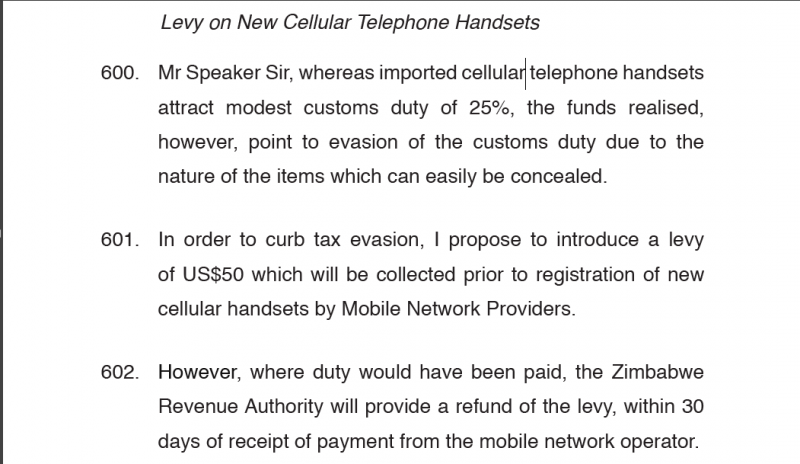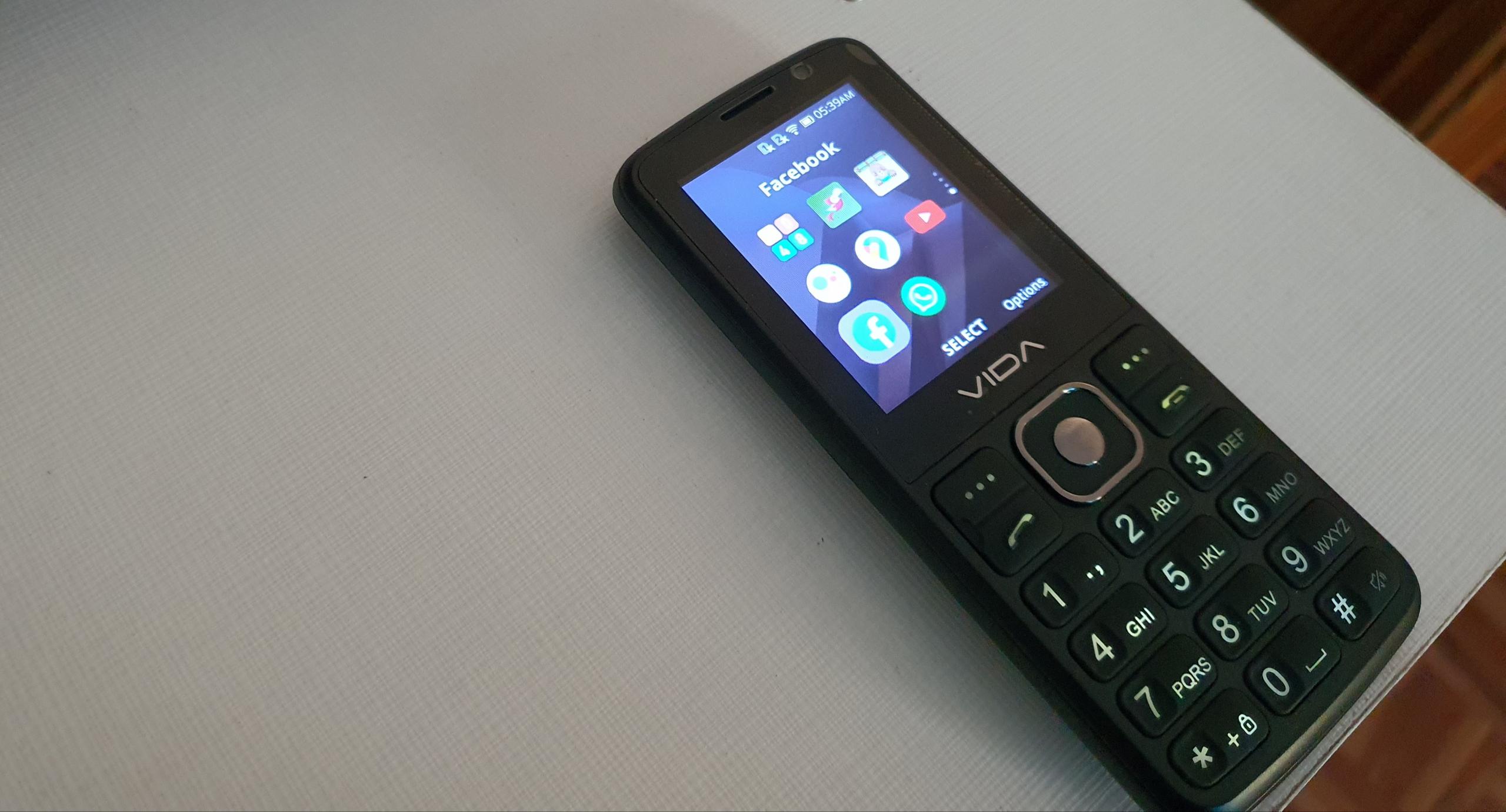
On the 25th of November, the Minister of Finance, Dr Mthuli Ncube released the national budget for 2022. There weren’t many surprises and it all read like we expected. As a result, this budget did not attract much conversation and didn’t even trend on Twitter. However, one little snippet of a new tax did manage to make the rounds.

600. Mr Speaker Sir, whereas imported cellular telephone handsets
attract modest customs duty of 25%, the funds realised,
however, point to evasion of the customs duty due to the
nature of the items which can easily be concealed.601. In order to curb tax evasion, I propose to introduce a levy
of US$50 which will be collected prior to registration of new
cellular handsets by Mobile Network Providers.602. However, where duty would have been paid, the Zimbabwe
Revenue Authority will provide a refund of the levy, within 30
days of receipt of payment from the mobile network operator.
When the minister was presenting his budget, the full 2022 budget was embargoed until after he was done with his presentation. The document we got after the lifting of the embargo was not the whole document but now we have the full thing.
Now that we have the full thing, we have to discuss paragraphs 600 through 602. Three short paragraphs that have caused so much rage.
Paragraph 600: 25% duty is modest?
Give governments a millimetre and they take a kilometre. The Finance Ministry under Mthuli Ncube is innovative when it comes to finding new ways to tax us. Now we hear the man himself say the 25% duty on phones is ‘modest.’ Modest? Meaning it’s too little for him. This man believes in taxing us to death.
What angers me personally is that in practice, it’s not even 25%. It’s more like 40%, as for other goods. I should know, I paid the 40% earlier this year. Is it any wonder people are concealing their phones to avoid paying this exorbitant tax?
He’s going to make me sound like an old man reminiscing about the good old days but I can’t help thinking back to the GNU years when tax on electronics was scrapped entirely. That’s when the ‘decent mobile phone penetration’ we have really kicked in. That’s when most Zimbos dabbled with smartphones for the first time as devices became accessible. Our mobile phone penetration shot up as a result.
Where would e-commerce be? All our WhatsApp and Facebook group traders would have fewer customers to serve. Where would mobile money be? How would banks have gone paperless when customers didn’t have the devices to use mobile banking services?
I guess we shouldn’t be surprised anymore that Mthuli Ncube is aggresive when it comes to his tax regime. The 2% IMTT is proof he doesn’t mind unfairly, harshly taxing us, as long as he can boast that we exceeded our revenue targets.
Captains of industry decried that it would be a double taxation and would have the effect of inflating cost of goods. In turn, inflating the prices the end users pay. Mthuli responded that the tax had turned perennial budget deficits into surpluses and so would stay. So it’s clear that for him, it’s budget surpluses at any cost.
Paragraph 601: US$50 tax on every new phone
Now this is the real shocker. Before even looking at what that entails, the fact that this is where the minds at the finance ministry drifted to says volumes. One colleague used the adjective ‘evil’ when talking about this move. I’m inclined to agree that it is a rather appropriate descriptor.
We just talked about the ridiculous 2% IMTT. Well, compared to the $50 duty, the 2% is the most reasonable tax in the world. The $50 does not take into account the price of the phone being registered. You could buy a $50 phone and the government would still want it’s $50 cut making for a 100% tax. If you got a bargain for a budget android phone for less than $50, you would pay more in tax than you did for the phone. Ridiculous.
One wonders if they thought this through.
The wording in the budget does not make it clear how this would all work in practice. I imagine it would just be that mobile network operators will have to prevent devices that haven’t been used on their network before from working. Econet, NetOne and Telecel can tell which device you are using and so it shouldn’t be hard to comply with the new directive.
When you insert an Econet SIM card in your phone, the phone has to communicate with them so that they know which bands it supports, whether it supports 3G, 4G or 5G and serve it accordingly. They can get the IMEI, serial number and device manufacturer this way. So, they could just maintain a database of the devices on their network, something they probably already do.
What this means is that when a device that has never been on their network is detected, they simply withhold service until the user proves they paid duty for the device. For this to work, the mobile network operators would have to share device information in a central database. This is so that if it’s just a case of the user switching sim cards, the user is not denied service.
Paragraph 602 would be moot.
Therefore the bit about ZIMRA refunding people their US$50 would not be necessary. Only those that cannot prove that they paid duty would pay. However, in theory we could have people who pay the $50 just to get service before locating the documentation proving they paid duty.
As to the legality of this business of working with the assumption that a device was smuggled, I don’t see any hurdles there. It’s perfectly fine for them to say we will assume you are a smuggler and charge you $50 which we will refund you once you prove you paid duty. That’s essentially how withholding tax works, you are charged tax that you can be reimbursed if you prove you are in right standing with the taxman.
The question on my mind is whether we are going to ignore all devices currently in use. Are we all going to have to prove that the devices we are using right now came in to the country legally? Could we all be booted out by the MNOs until we visited the nearest carrier shops with customs duty documentation for our 5 year old phones? Or maybe our account balances are deducted with US$50 worth of airtime instead? It sounds ridiculous but with Mthuli, it’s not beyond the realm of possibility.
More revenue enhancing measures
The paragraphs we talked about above fall under the heading, ‘Revenue Enhancing Measures.’ There are other measures under that heading and you are not going to like most of them.
- Duty on cigarettes – up from 20% + US$5.00/1000 cigarettes to 25% + US$5.00/1000 cigarettes [Okay, you might not care about this one, depending on the business you’re in.]
- Energy drinks duty – all you Red Bull, Monster and Dragon drinkers brace for an increase in prices. Mthuli wants US$0.05/ litre of energy drink entering the hallowed madzimbahwe lands.
- Withholding tax – up from 10% to a whopping 30%. This is a big one and Mthuli knows it. He says the 10% is too low and isn’t inducing compliance. I believe the 30% will induce compliance, you all better get your business’ affairs with the taxman in order and get your tax clearance.
- Motor vehicle insurance pool – short-term insurance providers have something to be mad about too. When foreign cars enter Zimbabwe they are forced to get temporary insurance and apparently very few end up claiming anything. The pool is distributed to the insurers but now 20% of the redistribution will go to the govt to be used to assist victims of accidents.
And that’s it. The govt is serious about it’s tax revenue and we better get used to it. Never you mind about the effects the high taxation could have on the struggling individuals and businesses in the economy. The govt knows best how to redistribute that tax revenue to champion economic growth.
You can download the full document below:

